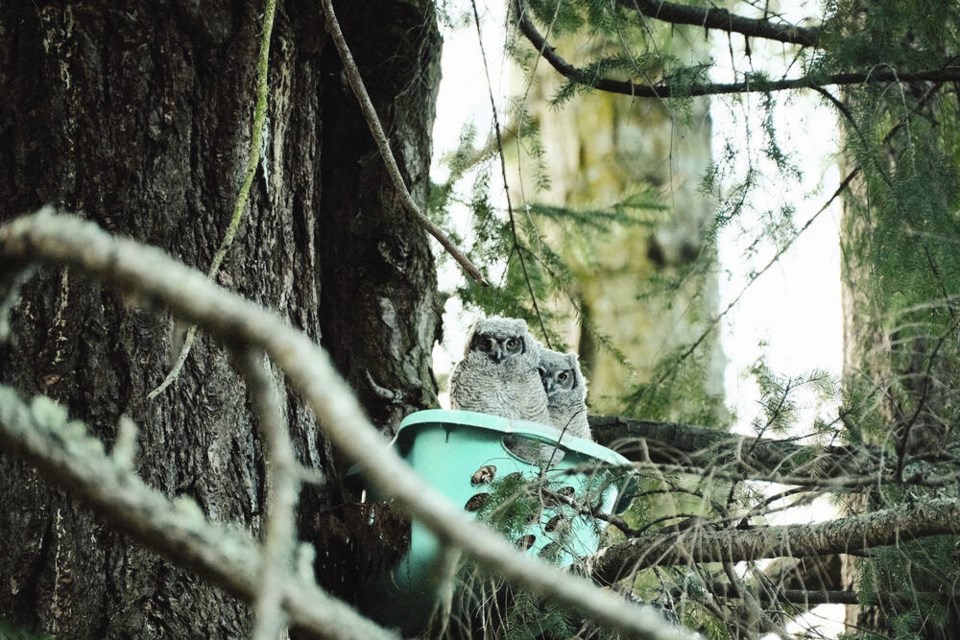A family of great horned owls with three babies has been photographed hanging out in a turquoise laundry basket perched in a tree in Saanich.
While it might look a bit strange, birder Ann Nightingale said it’s actually not uncommon.
Owls tend not to build their own nests, preferring to take over the nests of other birds, such as ravens, Cooper’s hawks, red-tailed hawks and bald eagles, said Nightingale, a volunteer with the Rocky Point Bird Observatory.
If they can’t find a suitable nest to take over, they’ll sometimes choose a human structure, like the laundry basket in Saanich.
“They’re looking for a cup-shaped place to lay their eggs and hunker down and have their young,” Nightingale said.
Years ago, a pair of great horned owls nested in a planter box outside the Pacific Forestry Centre on Burnside Road and raised three owlets “right outside someone’s office,” she said.
It’s possible the owlets in Saanich were rescued after their nest fell apart and placed in the basket, Nightingale said.
“It is pretty standard to take a laundry basket and strap it up to the tree where the owl nest was, put some branches in it and put the needles back in it,” she said. “And the parent owls are generally pretty happy with that.”
This should only be done by experts who handle wildlife, such as Wild Animal Rehabilitation Centre or similar private companies, she said.
“You could get a very sharp talon in a part of your body that you would not appreciatet, so do not try this at home,” she said. The basket could also have been up in the tree for years without attracting any inhabitants until now. Nightingale knows one person who put a basket up in a tree hoping to find owls nesting in it and it took seven years before owls moved in.
There are nests in forested areas all over the region right now, but most are hidden away.
“It’s just a matter of being lucky. And also being observant. People may be walking right under them in a wooded path and not even noticing,” she said.
A family of great horned owls nesting in Beacon Hill Park has drawn a lot of attention in the last month, because they were some of the first owlets to start leaving their nest and because they’re living in a very well-travelled public place, Nightingale said.
The two babies have been learning to fly for the last few weeks, taking short flights between nearby trees.
Nightingale said she’s surprised the owls haven’t moved farther away from people, but they don’t seem to be as annoyed by passersby as other birds.
“They seem to think they can probably take us and they’re probably right,” she said.
She’s curious to see if the owls nest in the same part of the park next year, because that would indicate it was a good nesting site for them.
Fledglings will continue to live with their parents, receiving food from them as they learn to hunt for themselves, until the fall, Nightingale said. Those living near a nest will likely hear the babies calling out for food as their parents wean them off their support.
>>> To comment on this article, write a letter to the editor: [email protected]



